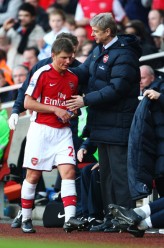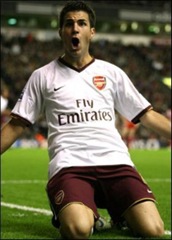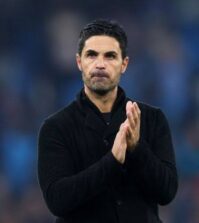- Arsenal pushing for Eberechi Eze summer move
- Arsenal confident of signing Viktor Gyökeres
- Arsenal interested in signing Forest’s Morgan Gibbs-White
- Arsenal ‘edging closer’ to signing Cristhian Mosquera
- Arsenal ‘most interested’ in signing Real Madrid’s Rodrygo
- Arsenal interested in signing PSG star Bradley Barcola
- Arsenal eye summer move for Maghnes Akliouche
- Arsenal ‘keen’ on signing Atalanta star Ademola Lookman
- Arsenal have ‘considered’ signing Liverpool target Ekitike
- Arsenal ‘dream’ of signing Real Madrid star Rodrygo
The Disconnect Between Modern Footballers and Supporters
The disconnect between modern footballers and diehard club supporters has grown beyond all proportions since the institution of the Premier League but most of it has happened in the last five to ten years. There seems to me to be two overriding factors which have contributed to the problem: wages and the influx of foreigners to domestic leagues.
Without wanting to focus too much on him, since he is only the most recent example and by no means the worst, Adebayor was quoted this week as saying:
“I know a lot of people will be saying, ‘He went for the money’. But I would like to hear any man, if he is honest, say he would refuse it if he was earning £10 and someone offered him £30.”
Of course, it doesn’t take into account that in this footballer’s world, it would mean that the average “any man” would be earning 5p a year in comparison to the footballers £30. The usual defense of footballers given is that they are workers just like anyone else, but let’s be honest. They are not the same as the guy who works 50+ hours a week to live check-to-check in a cramped apartment with his wife and 2 kids. Even before Adebayor’s move to City, he was twice as much in a week as the average blue collar worker earns in a year. These are obviously not the same situations.
The other defense is that footballers have a very short career span. And, of course, this is absolutely true. Yet, to hear Adebayor “worrying” about his retirement, while walking around in ridiculously expensive fur coats is quite rich. While the average person worries about being able to retire at all, Adebayor is worried about being able to still live like a playboy footballer long after his footballing days are over. That is what he means by retirement. In reality, he will have made more money in his career by the age of 26 than most people will make in their entire lives. So while it may be possible for supporters to understand Adebayor and other footballers’ concerns, it is absolutely impossible for them to identify or relate to them. And that is a huge disconnect.

This is one of the problem’s Arsene Wenger’s youth policy has been aimed at correcting a bit. Arsene has spoken about bringing in young players because it gives him time to “impregnate them with the culture of the club”:
I also felt the best way to create an identity with the way we play football, to get players integrated into our culture, with our beliefs, our values, was to get them as young as possible and to develop them together. I felt it would be an interesting experiment to see players grow together with these qualities, and with a love for the club.
And it has worked to a significant extent. Gael Clichy’s comments yesterday regarding Adebayor’s motives speak volumes. Coming not from a reporter or blogger but from someone who knows Adebayor well, Clichy said:
I really believe if you are a player who thinks only about money then you could end up at Manchester City. You have to think if you want to play for a big club and have your image or if you want to play for a good club and earn big money.
Arsene couldn’t have said it better himself. Clichy, along with Fabregas, is a prime example of the success of Wenger’s philosophy. By giving these players their opportunity at a young age and sticking by them, Arsene has developed a loyalty to both himself and the club which he now embodies. Cesc could’ve left in either of the previous two summers before this one. And, yet, Adebayor wonders why the fans didn’t “turn on” him. It’s because Cesc, growing up as a supporter of Barcelona, understands the dynamics involved in a supporters’ relationship with his club and its players. That is why, especially since being named captain, whenever rumours pop up in the media about him, he is on Arsenal.com within a day dispelling them. Clichy did the same thing when the Real Madrid rumours began flying following the conclusion of the season.
Many African players appear to be mercenaries because, without significant domestic leagues, and, until recently, without much television coverage, they do not grow up as hardcore supporters of a club and so do not understand the supporter’s paradigm of the game. The poverty in which many grow up also contributes to their “money first” attitude and that is completely understandable. But it also seems to be the reason why so many seem to lose perspective. This is what has happened to Adebayor and why he simply could not understand where the supporters were coming from. I mean, we’re talking about a guy who wears fur coats and speaks about himself in the third person.
All supporters would like to think that their form of loyalty is what motivates their club’s players, but deep down they know this is not the case. However, one of the most interesting paradigms of the modern game creates an even more curious piece of ‘football theatre,’ when even if a player feels no special love for their club, he is expected to act like he does and not openly betray the club so as to reveal as false the supporters’ false yet self-serving perception that, in their love for the club, they are one with the players.
In the end, it all comes down to motivation. Loyalty is the supporter’s prime emotional bond with his club. A supporter measures his worth, as such, by the depth of his loyalty to his club. That is his primary motivation. Footballers who grew up as diehard supporters understand this and know how to interact with them. One would hope more footballers would take the examples of Fabregas and Clichy to heart and see where an inability to understand the supporters’ perspective got Adebayor.








